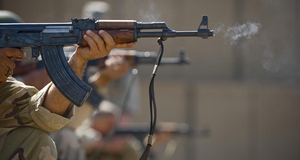From Cornell International Affairs Review VOL. 5 NO. 2Hot Cocoa: Agricultural Economics and the Ivorian Civil WarsChanging the Rules of the GameEven following the end of the second civil war in 2011, Côte d'Ivoire still appears unstable. The country's long period of turmoil has left it predisposed to political violence, and the divisions remaining within the country could still easily ignite.31 But what can be done not only to stop violence of this sort from recurring in Côte d'Ivoire, and what lessons can we glean from this war-torn country to prevent similar outcomes in similar countries in the future? The ICC prosecution of Laurent Gbagbo is a step in the right direction. The stigmatization of such a trial will hopefully discourage such mobilizations in the future. Severe Drought in the Sahel, combined with economic opportunity in Cote d'Ivoire, attracted millions of migrants in the decades following independence. The trial's location outside of the country should also keep Gbagbo, one of the main authors of Ivorian political xenophobia, from becoming a martyr among his supporters. However, if war does indeed ultimately stem from a series of rational choices and legitimate, calculated fears, the most significant steps that can be taken are substantive economic and political reforms. Countries should be more mindful of disparate effects their economic policies, such as investment, have on different demographic and ethnic groups, and how these differences define groups and help them mobilize. Commodity-driven countries should also take further steps to diversify their export economies, reducing their vulnerability to world markets. Finally, national leaders should restrain themselves from consolidating their control around their or any other specific ethnic group, if for no other normative ethical reason than the fear that this political exclusion backfire and serve as motivation for other groups to rebel. The 2010 Ivorian Presidential Election, which Gbagbo claimed despite having won fewer votes than Ouattara, was particuarily indicative of the continuing divisions within Cote d'Ivoire. Note the high overlap between coca production, dominated by southern groups, and the Gbagbo vote. The crises in Côte d'Ivoire have served as a textbook model for conflict not only in Sub-Saharan Africa, but also in regions worldwide. Various economic policies created a situation in which agricultural yields fell as a growing migrant population stoked resentment. The ensuing decline in rents motivated elites to exclude other groups from politics and economic benefits, hoping to consolidate power in their own political bases. Instead, this approach backfired disastrously, as repression instead promoted mobilization and the military division of the country. Opportunities for profit within the context of the conflict sustained fighting and gave leaders incentives to continue. Now that the country has finally come to a tentative peace, one must hope that profits fuel the rebuilding of the country instead of providing divisive fodder for its destruction. ReferencesAfrica Research Bulletin. “Blood Chocolate.” Economic, Technical and Financial Series 44.5 (July 2007): 17404. Fearon, James and Laitin, David. “Ethnicity, Insurgency and Civil War.” American Political Science Review 97.1 (February 2003): 75-90. Global Witness. “Hot Chocolate: How Cocoa Fuelled the Conflict in Côte d’Ivoire.” June 2007. Hecht, Robert. “The Ivory Coast Economic Miracle: What Benefits for Peasant Farmers?” The Journal of Modern African Studies 21.1(March 1983): 25-53. Langer, Arnim. “Horizontal Inequalities and Violent Group Mobilization in Côte d’Ivoire.” Oxford Development Studies 33.1(March 2005): 25-45. Lewis, Martin W. “Ethnic Dimensions of the Conflict in Côte d’Ivoire.” Geocurrents: April 28, 2011. http://geocurrents.info/geopolitics/ethnic-dimensions-of-the-conflict-in-ivory-coast University of Texas Map Collection. “Ivory Coast-Economic Activity, 1973.” http://www.lib.utexas.edu/maps/cote_d’ivoire.html Endnotes
Suggested Reading from Inquiries Journal
Inquiries Journal provides undergraduate and graduate students around the world a platform for the wide dissemination of academic work over a range of core disciplines. Representing the work of students from hundreds of institutions around the globe, Inquiries Journal's large database of academic articles is completely free. Learn more | Blog | Submit Latest in Political Science |





















